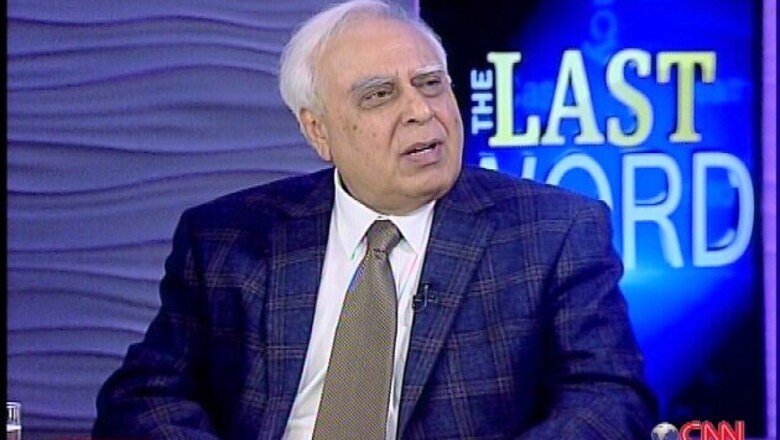
views
New Delhi: The arrest of two girls in Maharashtra for a Facebook post in which they criticised the closure of Mumbai over Bal Thackeray's death has become a national talking point. The event has outraged people all over the country who are now looking for answers from the state as well as the Central governments. Karan Thapar spoke to Information and Technology Minister Kapil Sibal in CNN-IBN's show 'The Last Word' on Monday night on 'Facebook arrest: Is it time to amend the law?'.
This is not the first time the provisions of the IT Act have been used by the police and other enforcement agencies to penalise people who has otherwise exercised their freedom of speech and expression. Thapar quizzed Sibal on the language of the IT Act which, because of its imprecise nature, lends itself to misuse by the enforcement agencies. Sibal, however, defended the language and instead focussed on training the enforcement agencies for a better implementation of the Act. Following is the transcript of the discussion between Thapar and Sibal:
Karan Thapar: Kapil Sibal, let me now talk to you as Information Technology minister. How do you respond to the fact that today the police in Bombay have arrested a 21-year-old girl for questioning on her Facebook page the total shutdown of the city after Bal Thackeray's death and for his funeral. And secondly, they have also arrested another girl for simply saying she has liked the comment.
Kapil Sibal: I am deeply disturbed by this. I don't think the (IT) Act is to be misused in this fashion. And I think if there are enforcement authorities using it in this fashion, then we need to have a relook because we want to make sure that this Act is not meant to prevent people from stating their point of view on any issue. The Freedom of Speech is a very important right and we need to protect it.
Karan Thapar: Now, according to police inspector Uttam Sonawane, who spoke to the Mumbai Mirror, the girl said on Facebook: 'People like Thackeray are born and die daily and one should not observe a bandh for that.' If that's all she wrote on her Facebook page, which is, as you know, essentially private, should the police have even arrested her?
Kapil Sibal: No, no, first of all, this offence is a bailable offence. So the police, the moment they serve a warrant, have to grant bail immediately. The police officer itself. So if somebody is taken into judicial custody to a magistrate, that's illegal use of the law.
Karan Thapar: So there are questions here for the police themselves who have mishandled the case.
Kapil Sibal: If they have arrested the girl and put her behind bars, absolutely.
Karan Thapar: Well, they arrested her and granted her bail. But they did arrest her.
Kapil Sibal: Well, that's because the law provides that. It's a bailable offence.
Karan Thapar: Now, you said a moment ago in answer to my first question that you need to look at the Section itself. Are you saying that the Section 66A of the IT Act, which is one of the sections under which she has been specifically arrested and which has been allegedly misused in the past as well, needs to be reviewed?
Kapil Sibal: Two things need to be done. We need to educate our enforcement authorities that this is not the way to use this particular Section. Two, if we want to make the assurance doubly sure, we may add an explanation to the section which is something we need to debate to ensure that such things do not happen.
Karan Thapar: You're talking of an amendment to the Section.
Kapil Sibal: Well, of course naturally. But all this will be done after a full discussion. At the moment, there is nothing unconstitutional about the Section, but if I find that this kind of abuse is taking place by misusing the Section, certainly, we will have to have a review.
Karan Thapar: Well, this isn't sadly the first time the Section has been allegedly misused.
Kapil Sibal: I am aware of that.
Karan Thapar: When someone tweeted about Mr Chidambaram's son, that person was charged with the Section.
Kapil Sibal: There he was taken to the Magistrate as well.
Karan Thapar: It happened in the case of the Jadavpur professor who forwarded a Mamata Banerjee cartoon, it happened in the Aseem Trivedi cartoon case, it also happened in the case of the woman in Chandigarh…
Kapil Sibal: Obviously, the enforcement authorities are not entirely familiar with the philosophy behind the Section and they are using it to, sort of, throttle dissent. And I don't think that's right.
Karan Thapar: We're focusing at the moment at the misuse of the Section by the police or other authorities and you're saying they aren't aware of the philosophy behind the Section. So there are either misunderstandings or abuse. Let me point out to you that the Section itself lends itself to misinterpretation and abuse. I am quoting from Section 66A of the IT Act. It says that anyone who uses a computer resource or a communication device to send out an information that is grossly offensive or menacing in character, or who passes on information which he or she knows to be false for the purpose of causing annoyance, inconvenience, obstruction and insult among other things can be jailed for upto three years.
Kapil Sibal: You haven't mentioned the fact that he is sending out this information by not disclosing the origin of the text.
Karan Thapar: But the point is...
Kapil Sibal: You haven't mentioned that. When you read a Section, you should read it entirely.
Karan Thapar: Absolutely. But the point is that the language is so vague and imprecise...
Kapil Sibal: (inaudible murmur)
Karan Thapar: Let me finish. Then you can answer. Grossly offensive, menacing in character, causing annoyance, inconvenience and insult are such vague and imprecise words that they can be used…
Kapil Sibal: I am sorry, but you have to read the entire Section. You're not reading the whole Section and Karan, I can't get into a debate on television with you when you only give me parts of the Section. You know that you're not reading the whole Section. So I think we better discuss it outside the studio.
Karan Thapar: Hang on. I am talking about the imprecision in the language.
Kapil Sibal: You must read the whole Section.
Karan Thapar: Then what about the part that I am reading?
Kapil Sibal: You're not reading the main Section which says that he intends to do this without disclosing the source. All that…
Karan Thapar: Let me read it for you. Any person who sends by means of a computer resource or a communication device any information that is grossly offensive or has menacing character or any information which he knows to be false, which I read out, for the purpose of causing annoyance, inconvenience or insult…
Kapil Sibal: If he knows them to be false.
Karan Thapar: Yeah, I read that out.
Kapil Sibal: So how can a person send information that he knows to be false?
Karan Thapar: Hang on. That's Section 2. In Section 1, it's not if it is false. In Section 1, it says any information that is grossly offensive or menacing in character…
Kapil Sibal: Grossly.
Karan Thapar: Who is to interpret 'grossly'?
Kapil Sibal: The court. Please, please. What is Article 19? What does public interest say? Article 19(2) says freedom of speech is restricted by certain provision of the Constitution. They have to be interpreted.
Karan Thapar: Except that this language is so imprecise that the police officer will necessarily misunderstand.
Kapil Sibal: You're completely wrong. This language is found in the penal court. This language is found in the Constitution and you will find these to be interpreted by the court only.
Karan Thapar: So, you don't accept that there is a need to change the language and make it more precise.
Kapil Sibal: See, these are things that we need to discuss. If people are misusing it, we need to move forward.
Karan Thapar: So you have an open mind about this?
Kapil Sibal: I have an open mind. I always have an open mind. But I am not going to say that merely because of the language, the power is being misused. I don't think so. It is clear what is grossly offensive. You know and I know. What is grossly menacing is something you know and I know.
Karan Thapar: Except that policeman in Bombay may have a different interpretation than you and I here.
Kapil Sibal: Therefore, we need to educate the enforcement agencies is what I said.
Karan Thapar: You might also need to change the language so that there is no further misuse.
Kapil Sibal: This language is used in the penal court as well. We can't abrogate the penal court because somebody is misinterpreting the language.
Karan Thapar: We have run out of time but I leave you with the last word today. Thank you for coming to the studio and answering my questions. That's it for tonight. See you tomorrow, same time, same channel. Good bye.
















Comments
0 comment